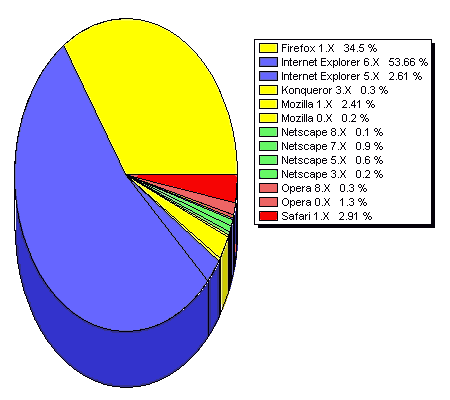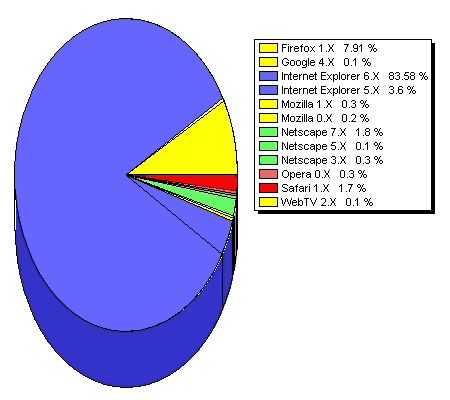I have not really had the time to do the research to form an opinion about Bush's judicial nominees, and the MSM is not very helpful in its coverage on the issue. I wrote here that the judiciary has started to overreach of late, legislating from the bench to advance an agenda generally supported by the Democrats. I don't know the candidates well enough to decide if these proposed judges are conservative activists who want to legislate from the bench but for conservative ends, or if they represent a first shot at reversing extra-constitutional judicial activism (which I would support).
However, I may have started to develop an favorable opinion on a couple of judges, based on what I have learned from their detractors.
Take this example, from a NY Times editorial, March 6, 2005. In disparaging how extremist Bush judge nominees are, they use the example of:
Janice
Rogers Brown, who has disparaged the New Deal as ''our socialist
revolution.''
Woe is me, I must be an extremist. First, the New Deal was clearly a "revolution", in that it was one of two events (the other being the Civil War) in the last 200 years that fundamentally changed the role of the federal government in what was a massive reinterpretation of the Constitution. But was it socialist? We can argue about whether the New Deal legacy that reaches us today is socialist or not- many quite normal non-extremist folks would argue yes and many similarly rational folks would argue no.
However, arguing the nature of the New Deal from what programs reach us today leaves out a lot of the picture. Much of the New Deal was voided by the Supreme Court. While some was re-passed later once FDR had a chance to remold the court with his own (for the time) extremist ideologues, some of the most socialist-statist-fascist legislation never was reinstituted.
The most dramatic of these institutions that fortunately were left on the cutting room floor was the National Industrial Recovery Act, or NRA. Roosevelt actually modeled the NRA on Mussolini's fascism in Italy, so I guess it might be more correct to call it fascist rather than socialist but in practice, I can't ever tell those two apart.*
The image of a strong
leader taking direct charge of an economy during hard times fascinated
observers abroad. Italy was one of the places that Franklin Roosevelt
looked to for ideas in 1933. Roosevelt's National Recovery Act (NRA)
attempted to cartelize the American economy just as Mussolini had
cartelized Italy's. Under the NRA Roosevelt established industry-wide
boards with the power to set and enforce prices, wages, and other terms
of employment, production, and distribution for all companies in an
industry. Through the Agricultural Adjustment Act the government
exercised similar control over farmers. Interestingly, Mussolini viewed
Roosevelt's New Deal as "boldly... interventionist in the field of
economics." Hitler's nazism also shared many features with Italian
fascism, including the syndicalist front. Nazism, too, featured
complete government control of industry, agriculture, finance, and
investment.
If you are not familiar with the NRA, you need to be if you are going to come to a conclusion about the New Deal and just how statist FDR's aspirations were. The actual text of the act is here. Henry Hazlitt has a long evaluation here. In the end, the NRA was scrapped in large part because it was a disaster for the economy. Many blame the NRA for strangling the recovery that began in 1933-34 and thus extending the depression. Parts of the law (collective bargaining, minimum wage) were incorporated in other later legislation, but the core concept of organizing industrial cartels with government backing to run industries and set prices, wages, and production levels died, fortunately.
Update: More here. Mr. Gregory quotes John Flynn's The Roosevelt Myth:
[Mussolini] organized each trade or industrial group or professional group into a state-supervised trade association. He called it a corporative. These corporatives operated under state supervision and
could plan production, quality, prices, distribution, labor standards,
etc. The NRA provided that in America each industry should be organized
into a federally supervised trade association. It was not called a
corporative. It was called a Code Authority. But it was essentially the
same thing. These code authorities could regulate production,
quantities, qualities, prices, distribution methods, etc., under the
supervision of the NRA. This was fascism. The anti-trust laws forbade
such organizations. Roosevelt had denounced Hoover for not enforcing
these laws sufficiently. Now he suspended them and compelled men to
combine.
* I disagree with people who want to argue that socialism is freedom but without property rights while fascism is property rights without other freedoms. Neither of these conditions are stable, and both converge to the same destination of suffocating statism, just with different starting points and different people in charge. One of the things that drive libertarians nuts is being presented with a grade school civics book that has a linear political spectrum with fascism on one end and communism on the other. Are those really my only two choices?



